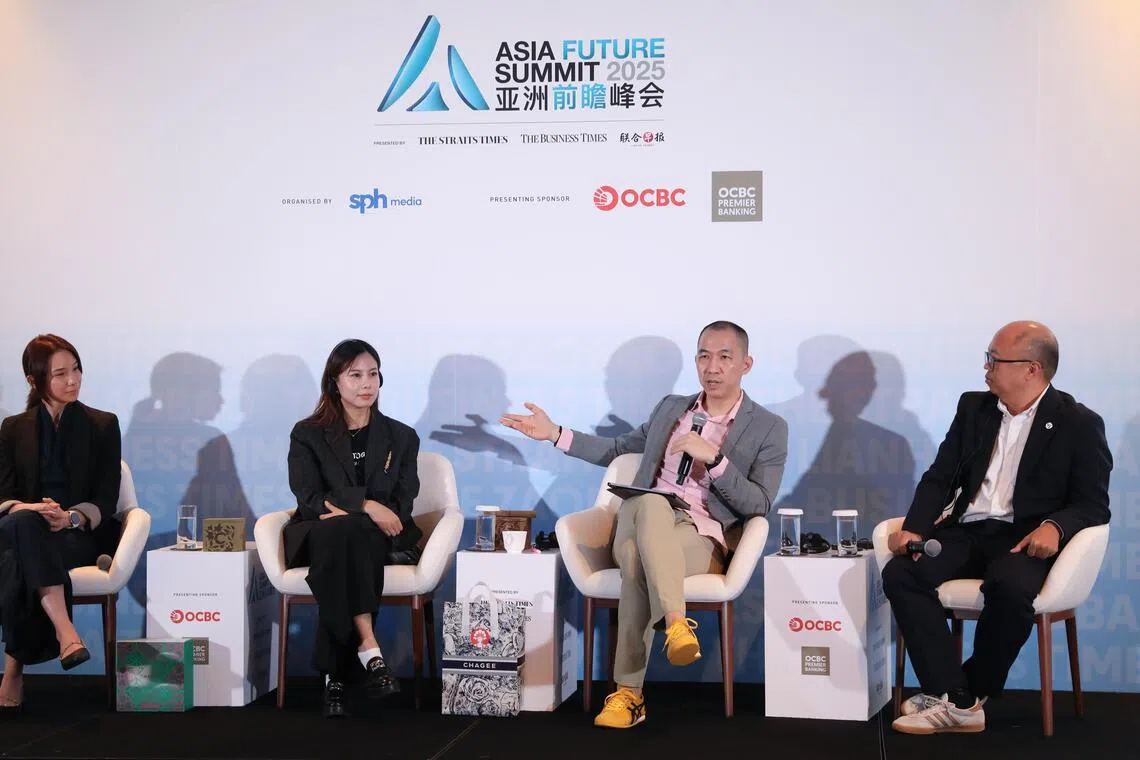Asia Future Summit 2025
Consumers driven by gratification and experience, not just cost, say Asian brand leaders
Sign up now: Get ST's newsletters delivered to your inbox

(From left) Ms Cheryl Cheong of Samsung Electronics Singapore, Ms Li Simeng of Chagee and Mr Lien Choong Luen of Gojek in a panel discussion moderated by ST associate editor Jeremy Au Yong.
PHOTO: THE BUSINESS TIMES
- Despite economic uncertainty, consumers will spend if retailers offer value, convenience, and emotional appeal, said Samsung's Cheryl Cheong.
- Gojek's Lien Choong Luen noted premium services grew as consumers seek faster trips and better food, enabled by AI-driven recommendations.
- Chagee's Li Simeng highlighted the "lipstick economy," with consumers favouring affordable luxuries like premium tea amid economic pressures.
AI generated
SINGAPORE - Today’s consumers may be increasingly cost-conscious in the face of an uncertain global economy, job disruptions brought about by advancements in artificial intelligence (AI) and stubborn inflation.
But they can be persuaded to spend if retailers use the right mix of AI, smart marketing and good consumer insights, said executives from Samsung, Gojek and Chagee in a panel discussion on consumer trends on Oct 9.
The panel was on the programme of the Asia Future Summit
Ms Cheryl Cheong, integrated marketing lead for mobile experience and monitors at Samsung Electronics Singapore, said: “Discretionary spending is going down, with all the geopolitical and socio-economic factors over these couple of years.”
But Samsung has worked to show its value to consumers, and positioned its products to appeal to both consumers’ wallets and their emotions, she said.
For instance, the South Korean electronics giant provides a long period of support for its mobile devices, both in terms of security updates and operating-system upgrades.
It also leverages advancements in AI to complement its digital appliances, such as its control tower for home appliances that can help save energy and money.
Samsung’s smartphones come with higher prices relative to competitor brands, but still hold a strong market share in South-east Asia, going by data compiled by the market research firm Canalys.
Utility paired with user satisfaction is also what Gojek, the Indonesian ride-hailing giant, pays attention to.
Gross Transaction Value for the company’s on-demand services, which include ride-hailing and deliveries, grew 9 per cent year on year to 16.4 trillion rupiah (S$1.28 billion), for the three months ended June 30, 2025.
There was “growth” in the premium segment for food deliveries and ride-hailing, even though these are regarded as utility services, said Mr Lien Choong Luen, Gojek’s Singapore general manager.
People want a faster trip or better food, he said, and the key to getting people to spend a little bit more for these things is to show good value at a reasonable cost.
The company also leverages AI to parse data and recommend new experiences to consumers, and this is evident in the food-delivery segment.
“Our job is to put in front of the customer more recommendations for things that they may not have tried, so they expand their portfolio of things they’re interested in,” Mr Lien said.
But as with any business success, timing is a key factor as well.
Ms Li Simeng, Chagee’s Asia-Pacific director of branding and marketing, said Chagee’s rise coincides with consumers who are seeking gratification in smaller and more affordable ways – a classic sign of the “lipstick economy”.
The term, also called the “lipstick effect”, is a theory that people tend to spend more on smaller, inexpensive items such as cosmetics in times of economic uncertainty.
Speaking in Mandarin, Ms Li said that while consumers a few years ago would look to purchase an expensive handbag or high-end vacation to reward themselves, consumers today are more interested in finding smaller pleasures in their daily lives, and are more likely to buy a lipstick or a cup of premium tea from a brand like Chagee.
She also said Chagee invests in elevating tea-drinking for consumers and in localising its offerings to appeal to consumers in markets outside China. She cited a ceramic set inspired by Peranakan culture being sold in Chagee’s Singapore outlets.
A Peranakan generally refers to a person of mixed Chinese and Malay or Indonesian heritage living in Singapore, Malaysia or Indonesia.
The mainland China premium tea brand, founded in 2017, was listed on the New York Stock Exchange
Chagee has more than 7,000 stores globally; most of them are in China, but the company has been expanding to South-east Asia and the United States in recent years. THE BUSINESS TIMES



